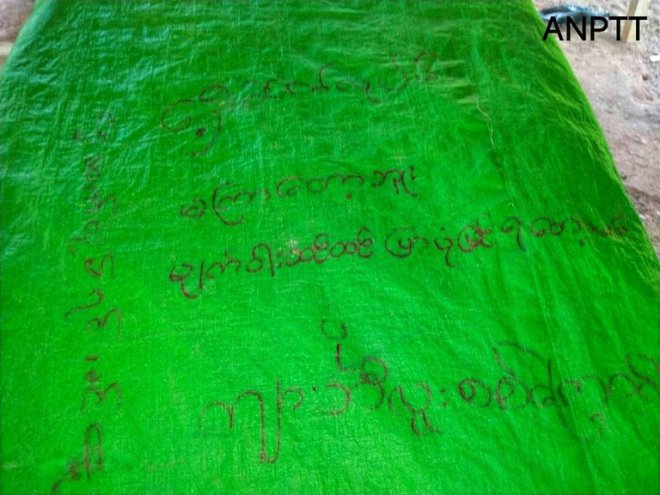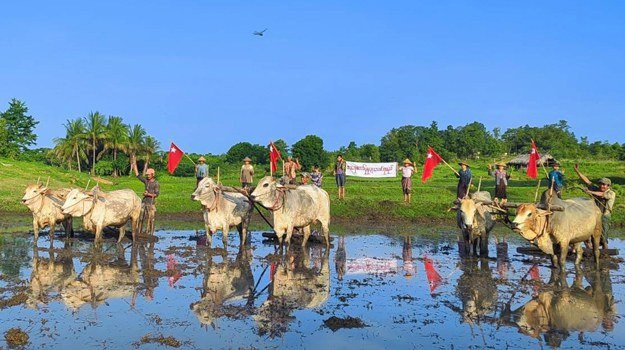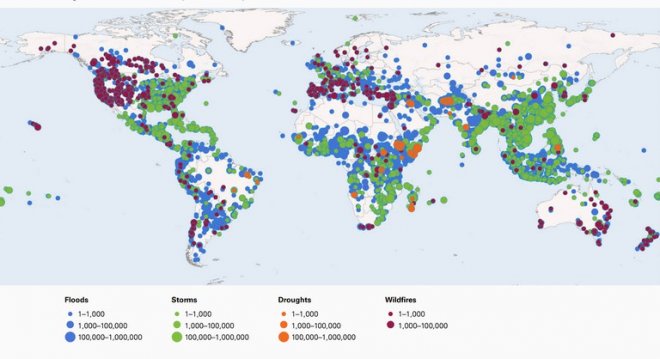China's 2022: A year of lockdowns, protests and mass COVID-19 infections
A momentous year of lockdowns, calls for Xi Jinping"s resignation, economic stagnation, street protests and the lifting of the zero-COVID policy has left China"s future looking much less predictable.China started the year amid an ongoing program of rolling lockdowns, mass tracking of citizens and compulsory coronavirus testing and a concerted effort by Communist Party leader Xi Jinping to garner political support for an unprecedented third term in office, drawing comparisons in some quarters with late supreme leader Mao Zedong.
It ended the year engulfed in a nationwide wave of COVID-19 deaths and mass infections after a dramatic U-turn in which the authorities abandoned Xi"s pet policy, lifting all quarantine requirements and travel bans in a bid to rescue the country"s flagging economy.
What happens next, now that a key Xi policy has been upended amid calls for his release from anti-lockdown protesters is hard to predict, analysts said.
White paper revolution
In the top-rated news story of 2022 ranked by Chinese social media users polled by Radio Free Asia, protesters used blank sheets of paper as a symbol of political opposition.
Blank sheets of paper were held aloft by demonstrators in late November to signify their opposition to anti-virus lockdowns, censorship and restrictions on free speech. As videos of crowds holding up paper sheets and chanting slogans flooded the internet, Chinese-language social media posts dubbed the demonstrations in more than a dozen cities the “white paper revolution.”
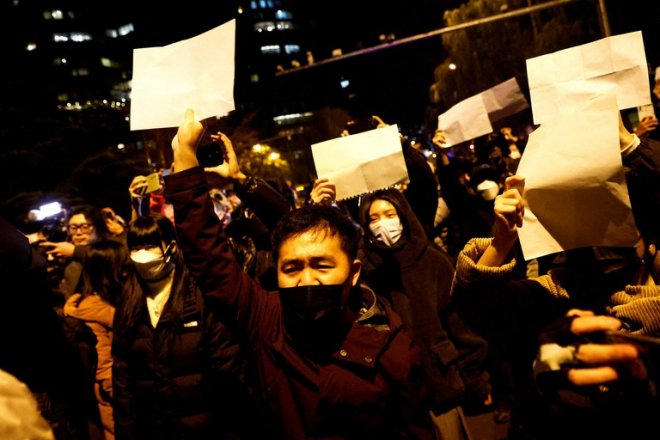 People gather for a vigil and hold white sheets of paper to protest COVID-19 restrictions, as they commemorate the Urumqi fire victims in Beijing, Nov. 27, 2022. Credit: Reuters
People gather for a vigil and hold white sheets of paper to protest COVID-19 restrictions, as they commemorate the Urumqi fire victims in Beijing, Nov. 27, 2022. Credit: ReutersMany protesters were responding to a fatal lockdown fire in Xinjiang"s regional capital Urumqi, in which the Uyghur victims were unable to escape as they had been locked into their homes.
On Nov. 26, a large crowd gathered on Urumqi Road in Shanghai to hold a vigil for the victims of the fire, holding up blank sheets of paper and chanting slogans.
Some people were filmed chanting lines similar to those emblazoned on a banner hung on a highway flyover by the Oct. 13 “Bridge Man” protester last month: "Remove the traitor-dictator Xi Jinping!"
A crowd of around 1,000 students gathered at Beijing"s Tsinghua University, Xi Jinping"s alma mater, after a student stood holding up a blank sheet of paper.
"We want democracy and the rule of law!" they chanted in video clips posted to Twitter by former 1989 Tiananmen Square protester Zhou Fengsuo. "We want freedom of expression!"
The protesters also sang the communist anthem The Internationale, which was also frequently heard during mass student-led protests in 1989, as well as China"s national anthem, which contains the line "rise up, you who are unwilling to be slaves!"
Bridge Man
These slogans were a direct reference to an Oct. 13 lone protest by Peng Lifa, who hung banners emblazoned with the same words from the Sitong traffic flyover in Beijing on the eve of the Communist Party"s 20th National Congress, before being taken away in a police car.
The "Bridge Man" protest was the second-ranked news story of the social media poll.
Peng was widely lauded by activists in China and overseas as a hero similar to the 1989 Tank Man of Tiananmen Square, with supporting protests emerging on a number of overseas universities.
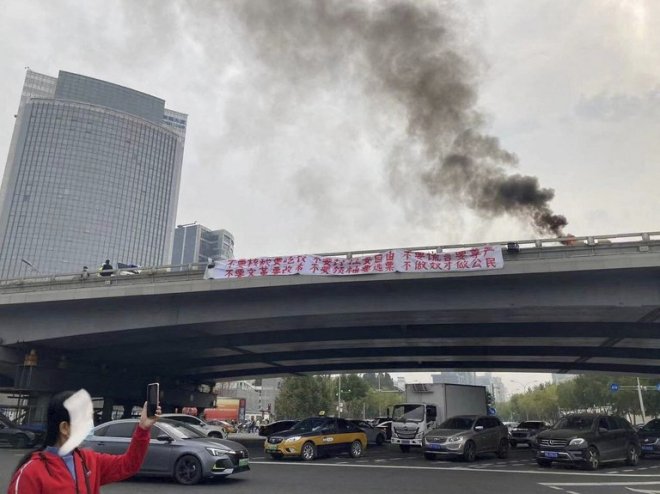 Smoke rises as a banner with a protest message hangs off Sitong Bridge, Beijing, Oct. 13, 2022. Credit: Reuters
Smoke rises as a banner with a protest message hangs off Sitong Bridge, Beijing, Oct. 13, 2022. Credit: Reuters"When people responded to Peng, they were agreeing with what he had to say," a student who gave only the surname Zhang for fear of reprisals told Radio Free Asia. "A government that locks down the whole of China and pays no attention to economic reality is an unreasonable government."
"The success of the white paper movement wasn"t just about getting demands met through protest, but also about mobilizing and uniting the Chinese people both at home and overseas," Zhang said. "But it was entirely predictable that people would stop protesting once most of their demands had been met."
End of zero-COVID
While the authorities moved quickly to quell the protests, they also responded by shutting down Xi"s hugely unpopular zero-COVID policy, which was the third-ranking news story of 2022.
On Dec. 7, the government issued a directive of "10 measures to optimize the management of the pandemic," which gave the green light to local authorities to lift lockdowns and end mass quarantine and testing procedures, while the National Health Commission announced in late December that it will no longer be publishing daily COVID-19 infection figures, as the virus ripped through the population unabated.
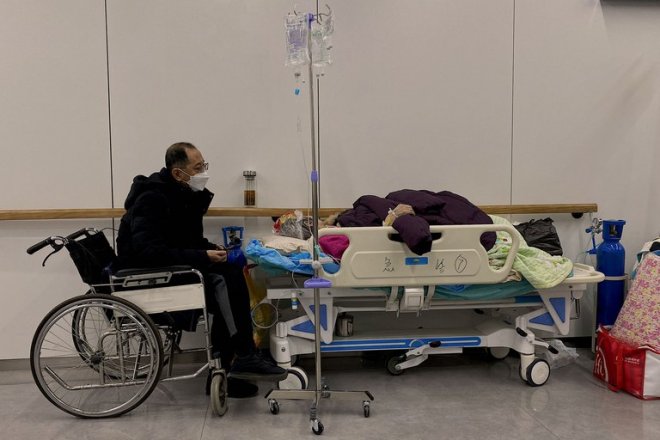 A COVID-19 patient lies on a bed at Tianjin Nankai Hospital in Tianjin on Wednesday, Dec. 28, 2022. Credit: AFP
A COVID-19 patient lies on a bed at Tianjin Nankai Hospital in Tianjin on Wednesday, Dec. 28, 2022. Credit: AFPThe government also said it would end mandatory quarantine on arrival for overseas travelers that had been in place since March 2020, starting from Jan. 8. Plans to open the internal border have also sparked fears of overwhelm in neighboring Hong Kong.
The move followed a leaked ministerial document dated Dec. 20 -- which analysts said was likely the result of computer modeling in the absence of widespread testing -- said around 250 million people may now be infected with COVID-19 following the lifting of control measures.
Politics scholar and democracy activist Wang Juntao said the protest movement had proved to be Xi Jinping"s political weak spot.
"When you have so many issues [converging], then ordinary people are going to be unhappy and take to the streets, which is Xi Jinping"s Achilles heel," Wang said. "It was very difficult for Xi to deal with, given that he had just managed to win absolute power for himself within the party at the 20th National Congress."
"Now, his power appears to have been weakened," Wang said.
Hu Jintao’s removal
That power was painfully demonstrated for many observers of top-level Chinese politics when Xi had his predecessor Hu Jintao forcibly removed from the dais at the closing session of the party congress, and visibly prevented him from reading the text he was about to present, a story that also ranked in the top 10 news stories of the year.
Seated at the leaders’ rostrum during the congress, a confused-looking Hu was physically lifted from his seat by a security guard and firmly escorted past leader Xi Jinping, whom he tried to talk to, and out of the hall.
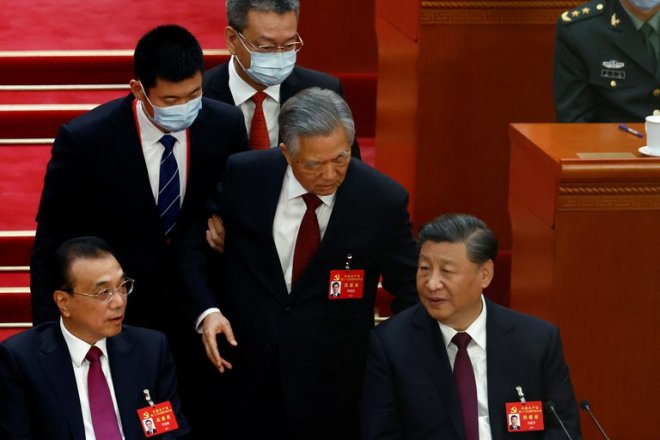 Former Chinese President Hu Jintao leaves his seat next to Chinese President Xi Jinping and Premier Li Keqiang, during the closing ceremony of the 20th National Congress of the Communist Party of China, at the Great Hall of the People in Beijing, Oct. 22, 2022. Credit: Reuters
Former Chinese President Hu Jintao leaves his seat next to Chinese President Xi Jinping and Premier Li Keqiang, during the closing ceremony of the 20th National Congress of the Communist Party of China, at the Great Hall of the People in Beijing, Oct. 22, 2022. Credit: ReutersThe incident prompted rampant speculation that Hu"s removal was a political statement from Xi and to show the total destruction of Hu"s political faction, which is closely linked to the Communist Party Youth League. Xi was later voted in for an unprecedented third five-year term in office, making him the most powerful Chinese leader since Mao Zedong.
Xia Ming, political science professor at New York"s City University, said the reverberations of Peng"s Sitong Bridge banner protest and the white paper movement are likely still being felt in Zhongnanhai.
"If any major changes occur, then the white paper movement will have played a major role in making that happen, because it mobilized the Chinese people and Chinese public opinion," Xia said.
"It made Xi Jinping realize his regime was being challenged, not to mention those people in party ranks who are dissatisfied with his rule."
Economic woes
Yet the economic damage from Xi"s zero-COVID policy is still ongoing, another top 10 story selected by respondents to RFA Mandarin"s social media poll. The World Bank has slashed its economic forecast for GDP growth this year in China from 4.3 percent to 2.7 percent, and next year"s forecast from 8.1 percent to 4.3 percent.
Xi"s response has been to call on the nation"s youth -- who are facing unprecedented levels of unemployment -- to seek out new opportunities in rural areas, echoing late supreme leader Mao Zedong"s call for urban youth to "go down to the countryside" during the Cultural Revolution (1966-1976).
But the countryside isn"t without its own pressing social problems, as demonstrated by the discovery of a chained woman in the eastern province of Jiangsu, another story that made the top 10.
Harrowing video footage of a woman from Jiangsu"s Feng county named by officials as Yang Qingxia showed her chained by the neck in an outbuilding on her husband"s property, prompting a public outcry and highlighting widespread trafficking in women and girls.
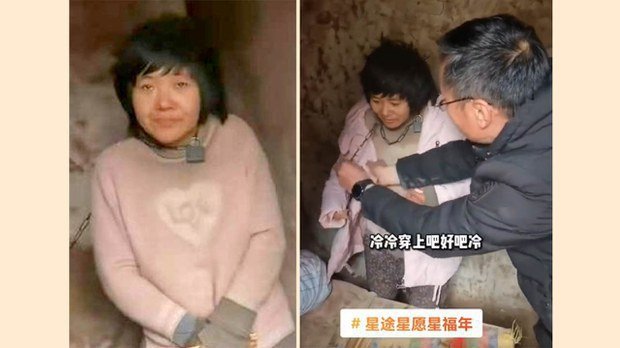 A woman identified as Yang Qingxia is shown sitting with a chain around her neck in a dilapidated hut at a rural property near Xuzhou city in the eastern province of Jiangsu. Credit: Screenshot from video via Douyin
A woman identified as Yang Qingxia is shown sitting with a chain around her neck in a dilapidated hut at a rural property near Xuzhou city in the eastern province of Jiangsu. Credit: Screenshot from video via DouyinYang"s husband Dong Zhimin was arrested on suspicion of domestic abuse in February 2022, but Yang"s whereabouts and status remain unknown.
The first stirrings that would become the white paper movement were actually first heard during the Shanghai lockdown in the spring of 2022.
The authorities quickly moved to delete and suppress a short film titled "Voices of April" from social media after it detailed a slew of oppressive measures and injustices at the hands of overzealous pandemic enforcement officials.
Listeners also rated the People"s Liberation Army"s live-fire military exercises around Taiwan during a visit to the democratic island by U.S. House Speaker Nancy Pelosi in August as a top story.
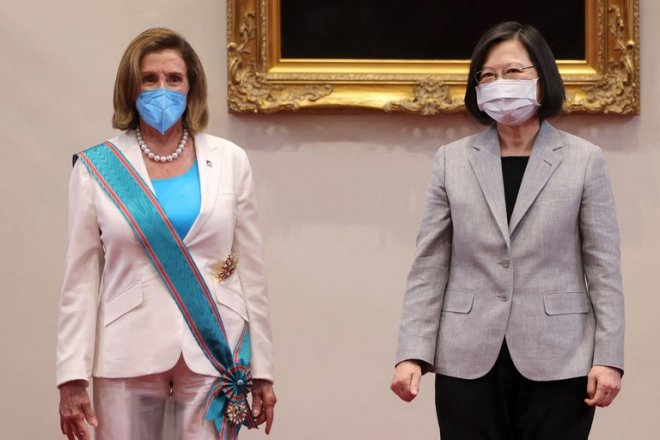 U.S. House Speaker Nancy Pelosi
U.S. House Speaker Nancy Pelosi stands with Taiwan"s President Tsai Ing-wen at the Presidential Office in Taipei, August 3, 2022. Credit: AFP/Taiwan’s Presidential OfficeAnalysts warned that China could use Pelosi"s visit to normalize military exercises, ignore the median line of the Taiwan Strait, and use ongoing military exercises to blockade the island and prepare its armed forces for an invasion.
The death of former president Jiang Zemin and the "run" phenomenon of mostly middle-class people leaving China to seek a new life elsewhere were also listed among listeners" top 10 stories of 2022.
There are signs that the "run" phenomenon could continue despite the lifting of COVID-19 restrictions. RFA Mandarin reported on a sharp spike in keyword searches for overseas flights on top travel platforms as soon as officials announced the lifting of travel bans and quarantine restrictions.
Translated by Luisetta Mudie. Edited by Malcolm Foster.
[圖擷取自網路,如有疑問請私訊]
The death of former president Jiang Zemin and the "run" phenomenon of mostly middle-class people leaving China to seek a new life elsewhere were also listed among listeners" top 10 stories of 2022.
There are signs that the "run" phenomenon could continue despite the lifting of COVID-19 restrictions. RFA Mandarin reported on a sharp spike in keyword searches for overseas flights on top travel platforms as soon as officials announced the lifting of travel bans and quarantine restrictions.
Translated by Luisetta Mudie. Edited by Malcolm Foster.
[圖擷取自網路,如有疑問請私訊]
|
本篇 |
不想錯過? 請追蹤FB專頁! |
| 喜歡這篇嗎?快分享吧! |
相關文章
AsianNewsCast









